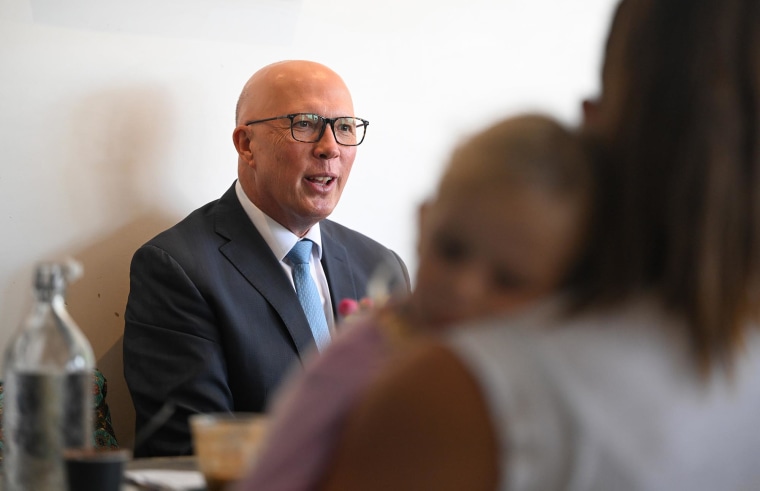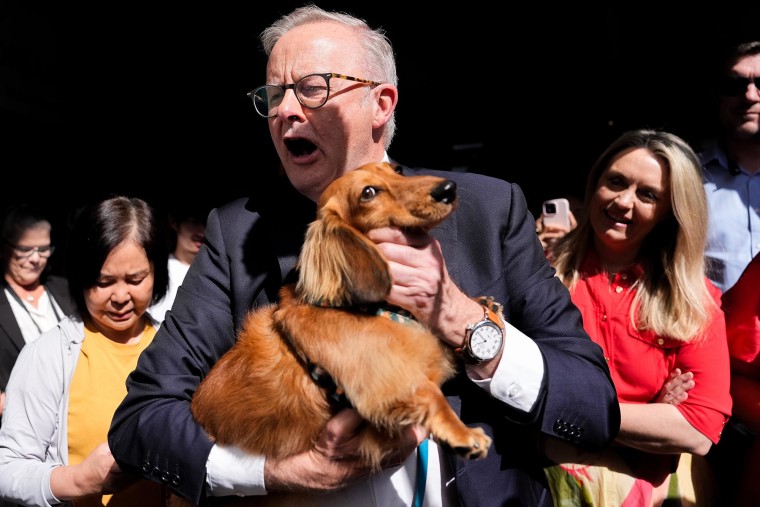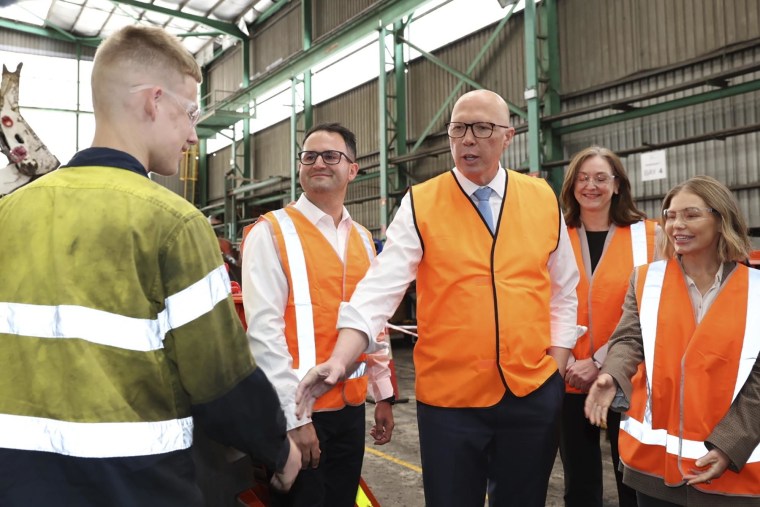After Canada, Trump could drag down conservatives in another election in Australia
Days after a Canadian election that hinged on who would best stand up to U.S. President Donald Trump, he is at the center of an election in another liberal democracy.
Trust in the United States is plummeting in Australia, which votes Saturday amid global financial turmoil sparked by tariffs Trump has imposed on trading partners around the world including Australia, a U.S. ally and vital security partner in countering China.
As in Canada, Australia’s opposition conservative party, the Liberal Party, was primed to win before Trump returned to office, thanks to public anger over the cost of living and record-high home prices. But it has since lost support among voters increasingly concerned about how their government will handle Trump.
On Thursday, two polls showed the Liberals trailing the center-left Labor Party, led by Prime Minister Anthony Albanese.
His opponent, Peter Dutton, has pushed the Liberals further to the right since becoming party leader in 2022.
His nods to Trump include pledging to slash 41,000 public service jobs, proposing to reduce legal migration to Australia and appointing a shadow minister for government efficiency, prompting his opponents to call him “DOGE-y Dutton.”

Though Dutton says he’s his “own person,” his association with Trump appears to have become a liability among Australian voters, said John Blaxland, a professor of international security and intelligence studies at the Australian National University.
“Dutton, perhaps overenthusiastically, endorsed President Trump’s victory without recognizing how difficult that would make his position — not with the bolted-on right, but with the swing voters, the center of the center, where all elections are won in Australia,” he said.
A poll released last month by the Lowy Institute, a research foundation, found only 36% of Australians expressed any level of trust in the United States — the lowest in the annual poll’s two-decade history.
Blaxland described Trump’s disregard for long-standing alliances and his quid pro quo approach to U.S. foreign policy as “vertigo inducing” for politicians, policymakers and voters in Australia, where voting is mandatory.
The Trump administration’s “hyperrealist, short-term, transactional approach to its relationships is deeply unsettling and corrosive of goodwill,” he said.
Trump has treated Australia as just another freeloader, slapping a 10% tariff on all exports to the U.S., even though the U.S. generally runs a trade surplus with Australia rather than a deficit. (In a rare deviation, Australia reported Thursday that it sold more to the U.S. than it bought in the first quarter as investors spooked by Trump’s tariffs rushed to buy gold, one of Australia’s top metals exports.)

While 81% of Australians disapprove of Trump’s tariffs, the vast majority (80%) continue to say the U.S. alliance is important for Australia’s security.
Those numbers reflect the economic and security dichotomy Australia faces: how to balance its security ties with the U.S. and its trade interests with China.
Albanese has spent his prime ministership working to stabilize relations with China, which nosedived under the previous conservative government, prompting China to impose punishing trade restrictions.
China is Australia’s largest two-way trading partner, accounting for 25% of the country’s goods and services trade in 2023-24. The U.S. is Australia’s third-largest two-way trading partner and largest source of foreign investment.
If the United States, which has imposed 145% tariffs on Chinese imports, “really damages the Chinese economy, then that is going to have a major impact on Australia,” said Stuart Rollo, a postdoctoral research fellow at the Centre for International Security Studies at the University of Sydney.
Rollo said he worries Australia could be caught in the middle if the U.S. tries to pressure its allies to reduce their economic ties with Beijing.
“So much of our future prosperity is tied with Chinese growth,” he said.
“For us to make the decision to disconnect from that — because we need American protection forever — that’s going to be a real cost to the living standards of Australians moving forward.”
Without the U.S., however, Australia would be cut off from critical military technology and far less protected against Chinese aggression.
Australia’s vulnerability was on display in February when the Chinese military conducted live-fire drills off the country’s coast, forcing dozens of commercial flights to reroute.

That’s why Australian politicians on both sides of the aisle say they remain committed to AUKUS, the security pact among Australia, the U.S. and Britain, even as Australians question whether they can still rely on the U.S. for their defense.
“We’re this kind of Anglo, European-transplanted community sitting on the edge of Asia, and [that] drives our fear of abandonment, which drives us towards the United States,” Blaxland said.
Under AUKUS, Australia is set to buy several nuclear-powered submarines from the U.S. as a deterrent against China.
But Australia would struggle to pay for those submarines without its trade relationship with China, said James Laurenceson, director of the Australia-China Relations Institute at the University of Technology Sydney.
“This is a big cost problem for a small economy like Australia,” he said. “We just can’t go all in on AUKUS, all in on the United States, all in on containing China and imagine that our trade with China, which is paying for our submarines, can actually be sustained. It can’t.”
Both Albanese and Dutton have downplayed any uncertainty around U.S. relations, but Laurenceson believes cracks are emerging in bipartisan support for the alliance.
“We’ll say that our security alliance with the U.S. is much more than just about one administration,” he said. “Yes, that’s true, but Trump is certainly challenging that.”



